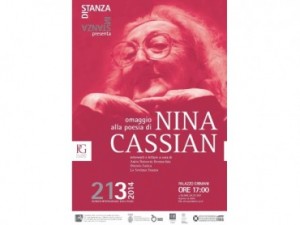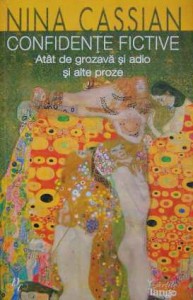Poetry in Translation (CCCLVIII), Nina CASSIAN (1925-2014),
ROMANIA/USA: “Donna Miraculata”, “Donna Miraculata”
Nina CASSIAN (1925-2014)
Donna miraculata
De când m-ai părăsit mă fac tot mai frumoasă
ca hoitul luminând în întuneric.
Nu mi se mai observă fragila mea carcasă,
nici ochiul devenit mai fix și sferic,
nici zdreanța mâinilor pe obiecte,
nici mersul, inutil desfigurat de jind,
– ci doar cruzimea ta pe tâmplele-mi perfecte,
ca nimbul putregaiului sclipind.
* * * * * * *
Nina CASSIAN (1925-2014)
Donna miraculata
Since you betrayed me I am more becoming
A body’s carcass glowing in the dark
My fragile self, invisible, yet stark,
With frozen looks and body which is pining.
My wretched fingers can’t feel any more
My useless walk, is pining with desire…
My cruel stare invisible, yet sore –
The halo of my body still on fire.
Rendered in English by Constantin ROMAN,
© 2015 Copyright Constantin ROMAN, London
* * * * * *
 SHORT BIO: Nina CASSIAN (1925-2014) is a personality of many facets and the contradictions of her life reflect, in a way, the tragedy of many Romanian intellectuals, whose career started before the war and subsequently had to adapt in order to survive, some of them more zealously than others. Nina Cassian falls into the latter category. For the generation that grew up immediately after the war, in communist Romania, Cassian’s poems were the staple diet of the Marxist textbooks – of ‘approved’ literature. After the fall of Ceausescu she said that she compromised ‘without conviction’, whilst she ‘tortured her artistry’… Well, other people who did not compromise at all were instead marginalized, starved, or worse, were thrown into prisons, where they died or, at best, came out only a ghost of their former selves. By contrast, Nina Cassian composed with those in power whilst the going was good. Anatol Vieru (1926-1998), another creature of sorry memory, turned her poems into cantatas. A “cantata” was the kind of epic intended to glorify the Communist Party. Cassian herself did not shrink from this kind of epic, singing the praise of the communist revolution in her own Symphonic poem “Grivita Rosie”, intended for an audience of workers and peasants bussed in by the Party coach loads, in 1950. These were the darkest years of Stalinist excesses, when most of the Romanian intellectual classes were dying under torture in political prisons.
SHORT BIO: Nina CASSIAN (1925-2014) is a personality of many facets and the contradictions of her life reflect, in a way, the tragedy of many Romanian intellectuals, whose career started before the war and subsequently had to adapt in order to survive, some of them more zealously than others. Nina Cassian falls into the latter category. For the generation that grew up immediately after the war, in communist Romania, Cassian’s poems were the staple diet of the Marxist textbooks – of ‘approved’ literature. After the fall of Ceausescu she said that she compromised ‘without conviction’, whilst she ‘tortured her artistry’… Well, other people who did not compromise at all were instead marginalized, starved, or worse, were thrown into prisons, where they died or, at best, came out only a ghost of their former selves. By contrast, Nina Cassian composed with those in power whilst the going was good. Anatol Vieru (1926-1998), another creature of sorry memory, turned her poems into cantatas. A “cantata” was the kind of epic intended to glorify the Communist Party. Cassian herself did not shrink from this kind of epic, singing the praise of the communist revolution in her own Symphonic poem “Grivita Rosie”, intended for an audience of workers and peasants bussed in by the Party coach loads, in 1950. These were the darkest years of Stalinist excesses, when most of the Romanian intellectual classes were dying under torture in political prisons.
Reading one of her recent interviews one can notice that Cassian had no regrets about her past ‘communist sympathies’, a euphemism which she currently uses to mellow, at the edges, her zealous and crass ‘proletcultism’. Yet, in the same breath, she goes on saying, that after Ceausescu’s death, that she was ‘no longer wanted in Romania’… which she wished to return to, only five years into her American exile… She assigns this ‘rejection’ by her fellow Romanians to an inherent ‘envy’ of the human nature – but this is not enough to justify the nausea expressed by those who stayed behind, who put up and shut up, without grovelling in sycophantic verse, to a dissolute dictatorship (i.e. ‘Hail Republic’, ‘The Red Grivita Railways Works’, ‘Pivotal Year, 1917’ and countless more).
 Nina Cassian left Ceausescu’s Romania in 1985, at the age of 61 and after 40 years of Communism, during which time, as a poet of the day, she published 50 volumes of verse (and some fiction) vetted by the censors of a dictatorship, which she helped to perpetuate. In defense of the poet it must be said that, according to an apocryphal story, she also wrote some scathing verse about Ceausescu. This was apparently found out when a close friend was arrested and tortured. At the time Cassian was already ensconced in New York on a Fulbright Scholarship, so she applied for and was granted political asylum in America. How lucky she was to have obtained such scholarship in the first place, because being granted this kind of unusual privilege and a passport to America, it implied that the communist establishment had complete and utter confidence that she would return to the fold.
Nina Cassian left Ceausescu’s Romania in 1985, at the age of 61 and after 40 years of Communism, during which time, as a poet of the day, she published 50 volumes of verse (and some fiction) vetted by the censors of a dictatorship, which she helped to perpetuate. In defense of the poet it must be said that, according to an apocryphal story, she also wrote some scathing verse about Ceausescu. This was apparently found out when a close friend was arrested and tortured. At the time Cassian was already ensconced in New York on a Fulbright Scholarship, so she applied for and was granted political asylum in America. How lucky she was to have obtained such scholarship in the first place, because being granted this kind of unusual privilege and a passport to America, it implied that the communist establishment had complete and utter confidence that she would return to the fold.
Perhaps Cassian’s verse, quoted above, sums up best the poet’s own view of herself, described as ‘hovering over the city’ she had left behind (Bucharest), ‘after a murderous massacre’ (communist oppression), flying over it with ‘an entire biography of dirty feathers’ (her mixing with the unholy).
Cassian translated William Shakespeare’s ‘Twelfth Night’ into Romanian, although one is amazed to hear, from Cassian herself, that her English was ‘sketchy’, when she arrived in the United States… Poor Shakespeare!
In exile Cassian used her selective memory to be reinvent herself as a “dissident anti-Communist”…
She died in New York in 2014.
See more in “Blouse Roumaine – the Unsung Voices of Romanian Women”:
http://www.blouseroumaine.com/
http://www.blouseroumaine.com/buy-the-book/index.html



No Comments so far ↓
There are no comments yet...Kick things off by filling out the form below.